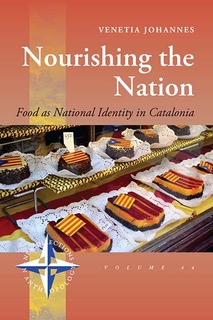Nourishing the Nation: Food as National Identity in Catalonia
By Venetia Johannes
In my ethnographic monograph, Nourishing the Nation: Food as National Identity in Catalonia (Berghahn Books, published 2019), I explore the everyday experience of national identity in Catalonia through the lens of food. As an everyday object of consumption, food provides unique insight into the lived realities of Catalan nationalism, and how Catalans experience and express their national identity in light of recent events, such as the rise in support for secessionist politics and changing identity politics in Spain as a whole. Here I would like to discuss some of my motivations for studying the topic and my approach, and my aims with the book.
Introduction to Catalonia
My first experience of Catalonia came in the summer of 2008, when I visited Barcelona and the region of Empordà. I came partly to practice Castilian Spanish, and also because of a fascination with the work of Salvador Dalí. Like many tourists, I had expected a ‘Spanish’ cultural and linguistic experience, and I was surprised by the strong presence of a clearly distinct Catalan language, particularly in the countryside outside Barcelona. I became fascinated by Catalonia’s individual culture and identity, and also came to love the place itself. Several year later while studying for a MSc in Social Anthropology in 2010, I began reading up on nationalism, ethnicity and identity for the weekly essay. These topics continually brought me back to my memories of Catalonia. Yet I felt frustrated at what I saw at the time as a gap in the literature on deep, ethnographic studies of nationalism, and on Catalan nationalism in particular. Much work on both subjects has focused instead on politics and history (hardly surprising considering their importance in nationalist movements). Yet I believe this focus tends to bypass the everyday experience of nationalism, making it harder to understand what truly makes these movements attractive to their practitioners, ‘what makes them tick’.
When I first began my study of Catalan identity in 2011, pro-independence politics was still perceived as a minority viewpoint, an unrealistic dream that few took seriously. However, by the time I arrived in summer 2012, this has begun to change. September 2012 saw one of the large pro-independence marches on ‘La Diada’, Catalonia’s national day (11th September), with over 1 million people taking to Barcelona’s streets. During my fieldwork from 2012 to 2013, I was able to watch how discussions of Catalan independence evolved from cautious incredulity to an accepted and vocal viewpoint. Tensions that had been simmering over several years exploded on 1st October 2017, leading to the removal of the regional government and imposition of direct rule from Madrid, an unprecedented move in Spain’s recent history. Today, the influence of Catalan independence politics can be felt, as the current Prime Minister, Pedro Sanchez seeks to create a coalition government and come to an agreement with President of Catalonia’s regional government, Quim Torra.
Food and nationalism
I had not planned to study food initially, and originally for my doctoral research (which was the starting point of the book) I had planned to look more broadly at the intersection between Catalan culture and Catalan nationalism – a task I soon realised was impossibly ambitious! I came to food by realising that it was something present in much ethnographic work on Catalonia, but was never a focus of study in its own right. Catalonia’s reputation as a centre of gastronomic excellence also played a part. To study food is also an excellent way to enter everyday life, and social lived realities. Societies also use food to differentiate themselves from others. Nationalism (and the expression of national culture) is in many ways a politicised expression of difference. Therefore, to use food as an everyday point of reference provides a useful lens through which to consider nationalism.
Structure of the book

This approach is part of a growing interest in the intersection between food and nationalism, which I discuss further in the Introduction of my book. The first chapter investigates the history of Catalan cuisine through its cookbooks. In the next chapter, I look at the foundational elements of Catalan cuisine, its sauces and main dishes. My third chapter considers Catalan cuisine in the context of Spanish cuisine and the Mediterranean, as well as international organisations such as UNESCO. The final two chapters look into festivals, seasonality and territory, including the intersection between national and festive foods in chapter five. In the Conclusion I present some of my findings from Catalonia, and provide suggestions for future researchers into food and nationalism.
The bigger picture
In autumn 2017, as Catalan independence politics reached boiling point and the international news media began to pick up on the story, I realised the time had come to publicise my work in book form. I hope that my book allows both a general and an academic reader to better understand the situation in Catalonia, and of the nature of nationalism in general. I would hope too that it is relevant not only for today’s readers, but those of the future too. I hope that it becomes a work of cultural history, by recording and representing the everyday lives, words and thoughts of Catalans during a tumultuous moment in Spain and Catalonia’s history.
——————
In 2019 Dr Johannes published Nourishing the Nation: Food as National Identity in Catalonia (Berghahn) which is the subject of this blog post, and co-edited The Emergence of National Food: The Dynamics of Food and Nationalism (Bloomsbury) with Atsuko Ichijo and Ronald Ranta. For other publications and interests, see https://oxford.academia.edu/VenetiaCongdon

Dr Venetia Johannes earned her DPhil in Anthropology at the University of Oxford in October 2015, where she also completed a MSc in Social Anthropology in 2011. Previously she studied business management at the Royal Agricultural University (2007-2010), and worked in finance and marketing research. She is currently a research affiliate with the School of Anthropology and Museum Ethnography at the University of Oxford.